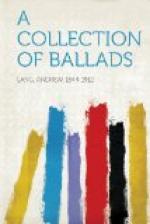Such are a few of the curiosities of the ballad. The examples selected are chiefly chosen for their romantic charm, and for the spirit of the Border raids which they record. A few notes are added in an appendix. The text is chosen from among the many variants in Child’s learned but still unfinished collection, and an effort has been made to choose the copies which contain most poetry with most signs of uncontaminated originality. In a few cases Sir Walter Scott’s versions, though confessedly “made up,” are preferred. Perhaps the editor may be allowed to say that he does not merely plough with Professor Child’s heifer, but has made a study of ballads from his boyhood.
This fact may exempt him, even in the eyes of too patriotic American critics, from “the common blame of a plagiary.” Indeed, as Professor Child has not yet published his general theory of the Ballad, the editor does not know whether he agrees with the ideas here set forth.
So far the Editor had written, when news came of Professor Child’s regretted death. He had lived to finish, it is said, the vast collection of all known traditional Scottish and English Ballads, with all accessible variants, a work of great labour and research, and a distinguished honour to American scholarship. We are not told, however, that he had written a general study of the topic, with his conclusions as to the evolution and diffusion of the Ballads: as to the influences which directed the selection of certain themes of Marchen for poetic treatment, and the processes by which identical ballads were distributed throughout Europe. No one, it is to be feared, is left, in Europe at least, whose knowledge of the subject is so wide and scientific as that of Professor Child. It is to be hoped that some pupil of his may complete the task in his sense, if, indeed, he has left it unfinished.
Ballad: Sir Patrick Spens
(Border Minstrelsy.)
The king sits in Dunfermline town,
Drinking the blude-red wine o:
“O whare will I get a skeely skipper
To sail this new ship of mine o?”
O up and spake an eldern-knight,
Sat at the king’s right knee:
“Sir Patrick Spens is the best sailor
That ever saild the sea.”
Our king has written a braid letter,
And seald it with his hand,
And sent it to Sir Patrick Spens,
Was walking on the strand.
“To Noroway, to Noroway,
To Noroway oer the faem;
The king’s daughter of Noroway,
’Tis thou maun bring her hame.”




